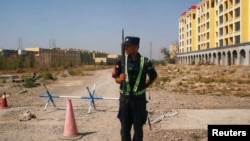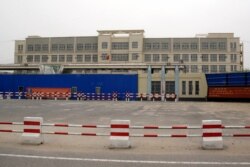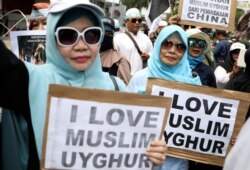When Halmurat Harri Elsoy learned in spring 2018 that his parents were detained in China’s internment camps, he turned to the only action he could use to fight for his parents in Xinjiang: harnessing the power of social media.
“In the beginning I feared China’s retaliation, but after both my parents being detained and repeatedly seeing China denying the detention of Uighurs, I thought I had nothing to lose,” Elsoy, a 35-year-old doctor exiled to Finland, told VOA.
For nearly two years, Elsoy has continuously used social media to organize the Uighur diaspora community and raise awareness about the plight of Uighurs, a majority Turkic ethnic group based in China’s northwest autonomous region of Xinjiang. His parents were released in December 2018, and he says he is committed to continue his online social activism until Chinese authorities change their policies.
“I am well aware that as long as the Chinese oppression continues against Uighurs, my parents and other relatives will not be able to escape China’s brutality,” he said.
Arrest, detention
Elsoy grew up in Turpan, a city located east of Xinjiang, and later finished medical school to work as a physician in No. 3 Hospital of Urumqi in 2008. Less than a year into his career, he was detained by police for maintaining international contacts.
“One day after work, I was arrested from my apartment. The reason for my detention was that I had too many foreign friends whom I had kept email communication with. I was let go after 10 days when my parents paid 100 thousand RMB (about $15,000 USD) ransom money to the authorities,” Elsoy said. “I decided to leave China after the incident.”
He moved to Finland in 2010 and became a Finnish citizen after his first child was born in 2014. He said he believes his online campaigns such as “MeTooUyghur” and media interviews helped secure the freedom of his parents.
“My parents were civil servants. They don’t fit into Chinese government's criteria of 'vocational training' to counter terrorism and religious extremism. They are not even religious and they don’t need any vocational skills training,” he said.
In December 2019, the Chinese government news outlet Global Times accused Elsoy of being a member of East Turkistan separatist groups and spreading misinformation about missing Uighurs. The outlet blamed rights watchdogs such as Human Rights Watch for “taking an active role in promoting these rumors.”
One million Uighurs
Since 2017, China has been accused by the international community of arbitrarily detaining more than 1 million Uighurs at incarceration camps, while imposing strict surveillance on those outside. Rights organizations say those in detention are put into indoctrination programs and forced to denounce their Islamic practices.
Chinese officials have denied the accusations, labeling their campaign as a deradicalization program or “vocational training” to help Xinjiang residents “learn Chinese and vocational skills.”
The officials most recently have said that all “students” from the camps have “graduated” and found jobs. But international rights organizations say they have been either sentenced to long prison terms or sent to industries where they are used as cheap labor.
Earlier this month, Elsoy learned from one of his friends in Xinjiang that his 45-year-old aunt, Shazadigul Tomur, had died in a cotton factory after being removed from detention.
“My aunt’s husband was sentenced to 15 years in prison and my aunt was forced to work in a cotton processing factory in Turpan for a minimum wage after she spent some time in the concentration camps,” Elsoy told VOA, adding she was the fourth relative who passed away since 2017.
Concerns of cultural loss
Elise Anderson, a senior program officer at the Uyghur Human Rights Project in Washington, says activists are “deeply” concerned about “the cultural and other forms of loss that their fellow Uighurs are facing in China.”
“Many young Uyghurs say that they are speaking out because their immediate and extended family members back home have disappeared, and because they want to speak up on their behalf,” Anderson told VOA.
According to some Uighur activists, Chinese authorities have long recognized the impact the Uighur diaspora can have with their global campaigns. One of those activists, Arslan Hidayat, told VOA that vocal Uighur activists abroad often face surveillance and online intimidation in a systematic effort to silence them.
“China’s threat and its propaganda against Uighur activists around the world is real,” said Hidayat, a 32-year-old Uighur-Australian music teacher currently residing in Bahrain.
Trolls
Hidayat started his internet activism in November 2018 after his father-in-law, Adil Mijit, a famous Uighur comedian in Xinjiang, was sent to the detention camps. He said his Facebook page, Talk to East Turkestan, has attracted thousands of followers and often gets threatened by nationalist Chinese trolls and government outlets.
“Our Facebook page is constantly attacked by CCP trolls to an extent where an article was written about this by the Global Times of China,” said Hidayat, speaking of a report by Beijing’s state media that claimed “patriotic Chinese netizens flooded the Facebook pages of East Turkestan terrorists.”
Hidayat last week launched the #HearUyghurs Campaign with another Uighur activist, Abdugheni Sabit, to mobilize the Uighur diaspora online to share information about their missing relatives in Xinjiang during the coronavirus pandemic.
Sabit, a 40-year-old exiled Uighur businessman in Amsterdam, Netherlands, told VOA that the activists were concerned that the COVID-19 crisis has led to even less coverage of Uighurs as China continues its crackdown in Xinjiang.
“Uighur activists around the globe have been highlighting the Uighur plight for decades that we’ve been oppressed by the Communist China, but China on the other hand with its economic and political influence has been trying to suppress our voice and even make us liars,” Sabit said.






